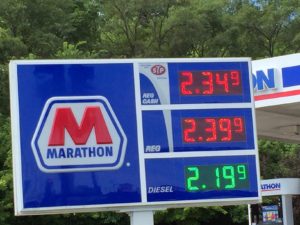
Save a nickel a gallon with cash!
Just driving around, you might notice something different at a gas station. A price for cash and a price for credit. They are listed individually because cash is less than credit.
The other day someone told me a repairman wanted to charge her 3% more to use a credit card. And they didn’t take checks. What’s a customer to do? Cash or credit only.
Do you pay more with plastic or less with cash? The choice is yours.
I’ve been there myself. The only difference is the businesses always took checks. So I was a check writing queen!
Cash over Credit?
The easy answer is to pay with cash to save money. But be sure to keep a record of the transaction. They should be able to give you a receipt, invoice or something to document your business transaction.
For more peace of mind or mere convenience, depending on the kind of transaction, you may opt to pay the additional fee and use your credit card. After all, you can dispute a credit card transaction should something go terribly wrong.
Why can they charge you more for using credit?
In most states (only 10 states prohibit retailers from charging a surcharge), it’s legal for a business to charge you more for using a credit card. However, most businesses don’t pass along additional charges (credit card swipe fees, surcharge) to their customers and simply chalk it up to the cost of doing business. But others can’t afford it, so they pass those charges on to you.
This means that you could pay an additional 1.5% – 4% on your credit card transactions. The key word to remember here is could, because it’s at the retailer’s discretion to charge you more (also known as swipe fee, checkout fee, convenience fee or surcharge).
For more on fees like this, check out the ABA Journal’s article “Federal appeals courts split over law on credit card surcharges.”

